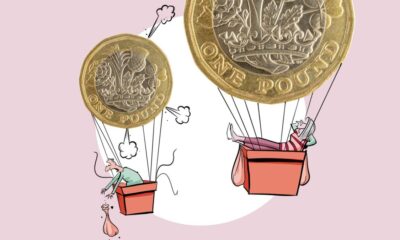Business
Calculate Your Path to Financial Freedom with FTSE 100 Dividends

Investors seeking to achieve financial independence often turn to the FTSE 100, which features some of Britain’s most established companies. Many of these firms provide stable, recurring dividends, making the index an attractive option for those looking to generate a secondary income. A pressing question for potential investors is: how much capital is necessary to retire and live solely off dividends?
Determining the required investment for financial freedom hinges significantly on individual lifestyle choices. For instance, an annual passive income of £30,000 necessitates a smaller investment portfolio compared to a target of £50,000. Aiming for the higher figure, the current dividend yield of the FTSE 100 stands at approximately 3.3%. This implies that an investment portfolio would need to reach just over £1.5 million to generate the desired income. While this may seem daunting, it could be attainable even for those with limited capital.
Historical data reveals that the FTSE 100 typically delivers around 8% annual total returns. If an investor contributes £500 monthly and reinvests dividends, they could accumulate the necessary £1.5 million in just under 38 years. The table below illustrates how varying monthly contributions affect the time to reach this goal:
Monthly Contribution | Time to Reach £1.5 Million
———————|—————————–
£500 | 38 Years
£750 | 35 Years
£1,000 | 30 Years
£1,500 | 26 Years
Accelerating Wealth Building
Achieving a £1.5 million portfolio is a lengthy process. However, investors who opt to select individual FTSE 100 stocks may find they require less capital to achieve their financial objectives. For instance, consider BP (LSE:BP), which currently boasts a dividend yield of 6.1%. At this yield, generating £50,000 annually would necessitate an investment portfolio valued at only £820,000. This represents a significant reduction in required capital, and assuming BP maintains an annual total return of 8%, the time to financial independence also decreases:
Monthly Contribution | Time to Reach £820,000
———————|————————-
£500 | 31 Years
£750 | 26.5 Years
£1,000 | 23.5 Years
£1,500 | 19.5 Years
While this may appear to simplify the path to financial freedom, several factors merit consideration. BP, a well-established player in the energy sector, has recently refocused its strategy on reliable fossil fuel revenue. The company anticipates over 20% compounded growth in free cash flow through 2027, which would facilitate reinvestment, debt reduction, and, crucially, increased dividends.
Despite its status as a FTSE 100 company, BP presents potential risks for investors. Commodity price volatility remains a concern, and the company’s strategic overhaul introduces execution risks. Part of this strategy involves divesting certain assets, which may temporarily impact production volumes. Furthermore, despite ongoing debt reduction efforts, BP’s leverage has yet to improve, adding pressure on its dividend payouts.
Given that BP is less than a year into its revised strategic approach, assessing its effectiveness requires patience. For investors with a higher risk tolerance, BP could be worth closer examination due to its potential rewards.
In summary, while the journey to financial independence through FTSE 100 dividends can seem overwhelming, understanding the numbers and evaluating individual stock options can help investors carve a path to their financial goals.
-

 Entertainment3 months ago
Entertainment3 months agoAnn Ming Reflects on ITV’s ‘I Fought the Law’ Drama
-

 Entertainment4 months ago
Entertainment4 months agoKate Garraway Sells £2 Million Home Amid Financial Struggles
-

 Health3 months ago
Health3 months agoKatie Price Faces New Health Concerns After Cancer Symptoms Resurface
-

 Entertainment3 months ago
Entertainment3 months agoCoronation Street’s Carl Webster Faces Trouble with New Affairs
-

 Entertainment3 months ago
Entertainment3 months agoWhere is Tinder Swindler Simon Leviev? Latest Updates Revealed
-

 Entertainment4 months ago
Entertainment4 months agoMarkiplier Addresses AI Controversy During Livestream Response
-

 Science1 month ago
Science1 month agoBrian Cox Addresses Claims of Alien Probe in 3I/ATLAS Discovery
-

 World2 weeks ago
World2 weeks agoBailey Announces Heartbreaking Split from Rebecca After Reunion
-

 Health4 months ago
Health4 months agoCarol Vorderman Reflects on Health Scare and Family Support
-

 Entertainment4 months ago
Entertainment4 months agoKim Cattrall Posts Cryptic Message After HBO’s Sequel Cancellation
-

 Entertainment3 months ago
Entertainment3 months agoOlivia Attwood Opens Up About Fallout with Former Best Friend
-

 Entertainment2 weeks ago
Entertainment2 weeks agoCoronation Street Fans React as Todd Faces Heartbreaking Choice





















